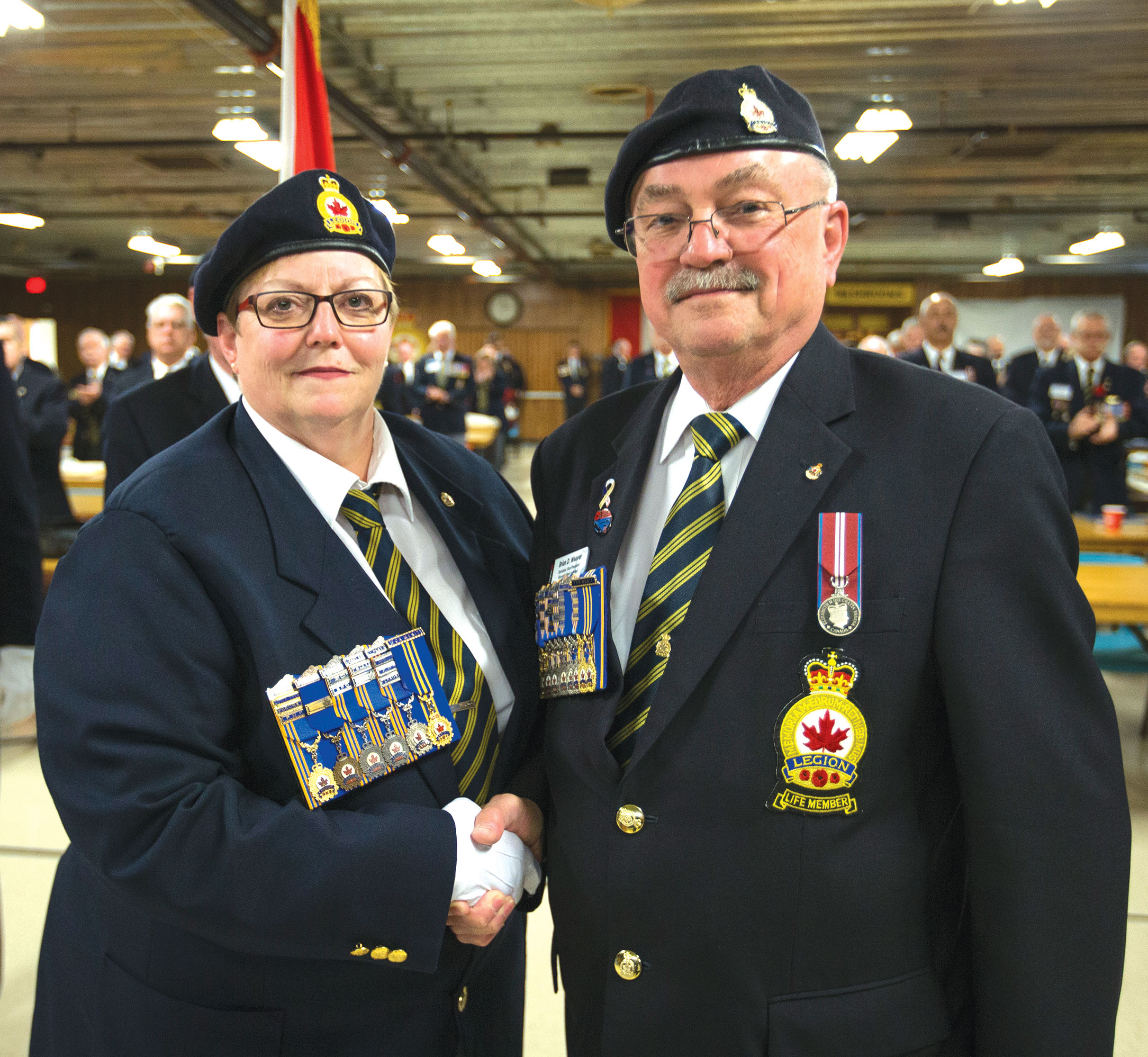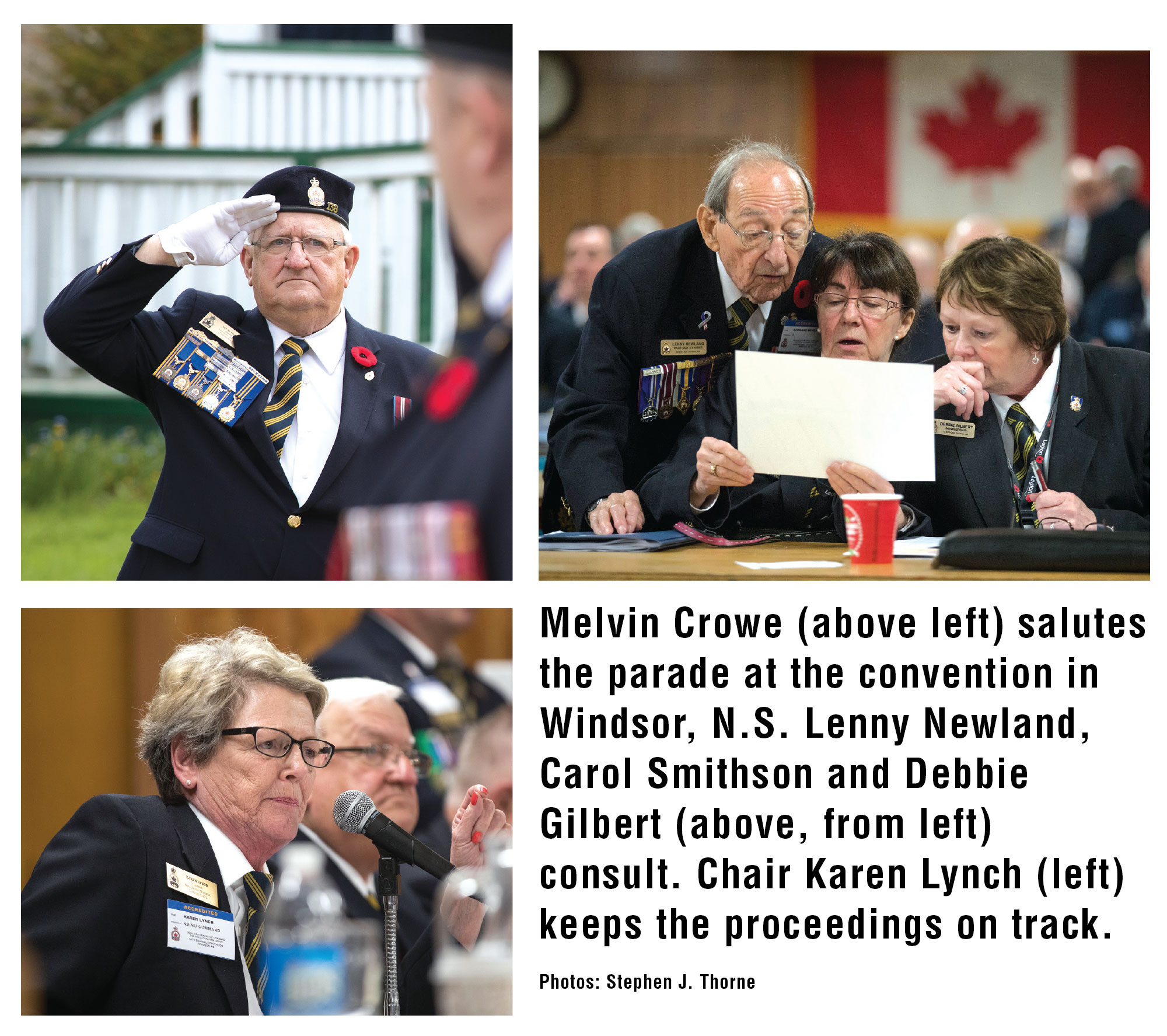

Incoming Nova Scotia/Nunavut president Marion Fryday-Cook is congratulated by Dominion Vice-President Brian Weaver. [Stephen J. Thorne]
Ken George and Stephen Tedford are busy men.
As Halifax-based service officers for Nova Scotia/Nunavut Command of The Royal Canadian Legion, they are managing hundreds of veteran-related files, fielding first-time callers daily, launching appeals, and working at the vanguard of the battles the Legion was created to fight.
The two help veterans get treatment, compensation, pensions and services—both government and Legion—while running the country’s second-largest provincial command service bureau, after Ontario, in its seventh largest province.
The bureau handled 791 Veterans Affairs files in 2018—and more than 400 by the time the command held its biennial convention May 18-20 in Windsor, N.S., where veterans’ services were central to two days of discussions among 279 delegates.
“It’s like any job, it has its good days and bad days,” said Tedford, who served 25 years in the navy. “But, my gosh, at the end of the week when I look back and see the people that I helped…it’s pretty darn rewarding.”
The ambitious pair conducted 27 home visits in 2018, up from 12 in 2017. They had 219 disability claims approved last year, double 2017, and lost just 22. The claims were worth $11.5 million in lump-sum payments. They also achieved new pensions or pension increases for 20 veterans.
The awards include medical benefits for service-related issues, from hearing loss and musculoskeletal injuries to cancers, Parkinson’s disease and post-traumatic stress disorder.
“They’re here because of word of mouth from other people we’ve helped,” said George, an army veteran who delivered his bureau’s annual report at the convention.
Nova Scotia is home to Canada’s Atlantic naval fleet, the Halifax dockyard, Canadian Forces Base Greenwood and CFB Shearwater. The military life has always been attractive to Atlantic Canadians.
The command’s 103 Legion branches and 19,376 members are among the most active and engaged in the country. Veterans were prominent among the convention delegates, who donated $15,787 to the Royal Commonwealth Ex-Services League to be used by Dominion Command to help impoverished veterans in the Caribbean.
“We need our veterans to help us go in the right direction,” said the command’s newly elected president, Marion Fryday-Cook of F.E. Butler Branch in Chester. “If they’re not supporting us and giving us incentive to move forward, we don’t know what they need. So, to have their input is certainly a wonderful thing.”
Indeed, Nova Scotia/Nunavut Command has been a leader in bold and innovative programming for veterans, committing $250,000 to service dogs over this year and next despite Dominion Command’s position that Canada needs a national standard for service animal training.
The command has partnered with the service dog program Paws Fur Thought and, at convention time, had matched 120 dogs and handlers.
“We have all become aware of the positive, documented results of pairing ill and injured veterans with service dogs,” reported Steve Wessel, chairman of the command’s Veterans Outreach Program Committee. “What most are not aware of is that the supply of trained service dogs is of grave concern.
“Current wait-lists for veteran assist dogs are approximately two years long,” said Wessel.
The command’s executive council considers providing service dogs to those in need part of Legionnaires’ sworn commitment to provide support to ill and injured veterans. But money is always an issue, particularly among smaller and more remote branches, some of which struggle to maintain membership numbers.
Delegates debated a contentious resolution that would have required the command to report all its expenditures to local branches before the money goes out the door. The proposal was defeated, 88-41, based partly on the argument that it would have handicapped the command’s ability to serve veterans promptly and effectively.
Fryday-Cook said the No. 1 challenge of her two-year tenure will be finding veterans in need, helping them make claims and getting them into programs.
More and more, those veterans are finding help in small, veteran-run efforts like The Veteran Farm Project, a horticulture-based rehabilitation program in Sweets Point, N.S., and Rally Point Retreat, a rural rehab facility in Sable River, N.S., both of which gave presentations at the convention.
“Veterans with PTSD don’t want to be in big crowds,” said Fryday-Cook, who was acclaimed president. “So if they’re coming to us with programs that they’ve started for smaller groups, smaller organizations, addressing women, that’s what we’re going to support because that’s what they want and that’s what they need.
“These are the wave of the future—small groups of like-minded people supporting each other and we at the Legion need to support them in their endeavours.”
Service officers George and Tedford know well the satisfaction in seeing local Legion efforts come to fruition, one veteran at a time.
“I wish I did this years ago,” said George, who commutes more than 200 kilometres a day to and from the service-bureau office. “I love this job with a passion.”
In his parting address, outgoing president Melvin Crowe of Ashby Branch in Sydney noted the rising numbers of veteran case files and thanked his service officers for their hard work.
Dominion Vice-President Brian Weaver stressed the importance of refining membership recruitment and “creating a more welcoming culture.”
Donna McRury of Whitney Pier Branch was acclaimed First Vice, while Mervin Steadman of Ortona Branch in Berwick defeated two challengers for Second Vice. Conrad Gilbert of the host Hants County Branch in Windsor was the unanimous choice for treasurer, and Karen Lynch of Eastern Marine Branch in Gaetz Brook will stay on as chair after being unopposed.
Advertisement


















